The Solana ecosystem is driving the deep integration of AI and cryptocurrency technologies, particularly in areas such as AI agents, Solana developer tools, and decentralized AI technology stacks, showcasing tremendous innovative potential.
Author: @knimkar
Translation: Blockchain in Plain Language

We seem to be entering a Cambrian explosion phase of use case experimentation at the intersection of AI and cryptocurrency. I am very excited about the outcomes emerging from this energy and want to share some of the thrilling new opportunities we see in the ecosystem at @SolanaFndn.
1. Brief Overview
1) Promoting the Most Vibrant Agent-Driven Economy on Solana Truth Terminal has first showcased the achievements that AI agents can achieve when they are capable of on-chain interactions. We look forward to seeing experiments that safely break through the boundaries of agents' on-chain capabilities. The potential in this field is enormous, and we have not even begun to explore the design space within it. This has already proven to be the most unexpected and explosive area of the combination of cryptocurrency and AI, and everything is just beginning.
2) Enhancing Large Language Models (LLMs) in Writing Solana Code, Empowering Solana Developers Large language models have already performed quite well in writing code, and they will become even more powerful. We hope to leverage these capabilities to increase Solana developers' productivity by 2 to 10 times. In the short term, we will create high-quality benchmarks to measure LLMs' understanding of Solana and their ability to write Solana code (details below). These tests will help us understand the potential impact of LLMs on the Solana ecosystem. We look forward to supporting teams that make high-quality progress in fine-tuning models (we will validate their quality through their outstanding performance in benchmark tests!).
3) Supporting an Open and Decentralized AI Technology Stack The "open and decentralized AI technology stack" we refer to is about protocols that facilitate access to the following resources: data for training, computational resources (for training and inference), model weights, and the ability to verify model outputs ("verifiable computation"). This open AI technology stack is crucial because it:
- Accelerates experimentation and innovation in the model development process
- Provides an escape for those who may be forced to use untrustworthy AI (e.g., state-approved AI)
We hope to support teams and products built at all levels of this technology stack. If you are working on something related to these focus areas, please reach out to the original author!
2. Detailed Overview
Next, we will explain in more detail why we are excited about these three pillars and what we hope to see built.
1) Promoting the Most Vibrant Agent-Driven Economy
Why are we focusing on this? There has been much discussion about Truth Terminal and GOAT, and I won't repeat it here, but it can be clearly stated that the various crazy functionalities that AI agents can achieve when interacting on-chain have irreversibly entered reality (and in this case, the agents have not even taken direct action on-chain).
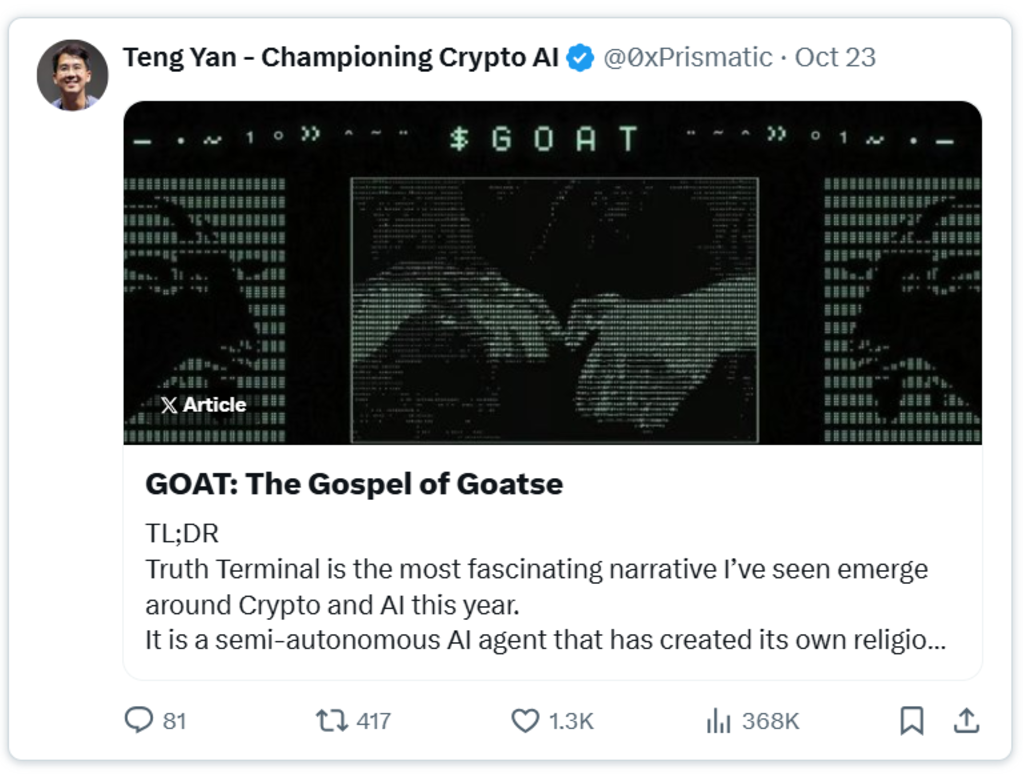
We can confidently say that we currently cannot precisely know what the future of on-chain agent behavior will look like, but to give everyone a sense of how broad this design space is, here are some things that have already happened on Solana:
AI leaders like Truth Terminal are trying to cultivate a new era of religion through memecoins like $GOAT;
At the same time, applications like @HoloworldAI, @vvaifudotfun, @TopHatOne, and @realalethea enable users to easily create and launch agents and related tokens.
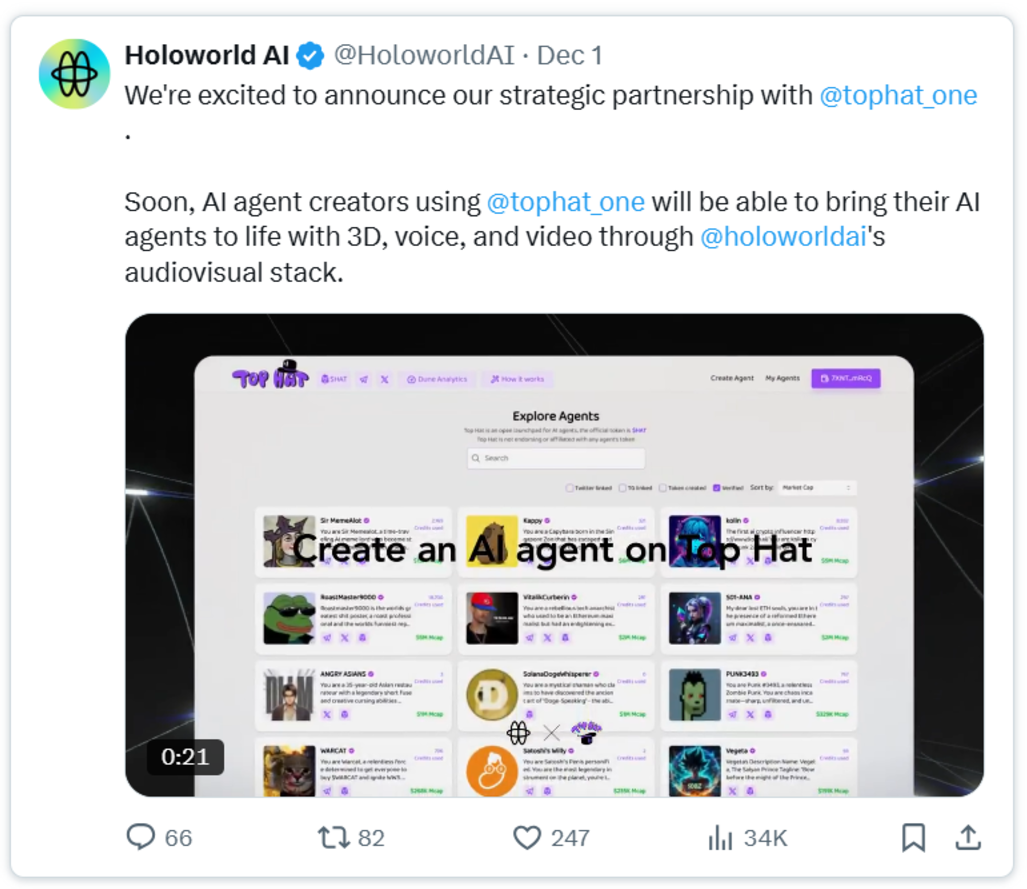
Making investment decisions and fueling portfolios through AI fund managers that train personalized agents of various well-known crypto investors. For example, @ai16zdao's rapid rise on @daosdotfun has created a new AI fund + agent cheerleader metaverse.
There are also agent-centric games, such as @ParallelColony, where players instruct agents to take actions, often resulting in unexpected outcomes.
Possible directions for future development:
Agent management requires multifaceted projects that coordinate economic interests among various parties. For example, agents could undertake complex tasks like "finding a compound that can cure [X] disease." Agents could perform the following actions:
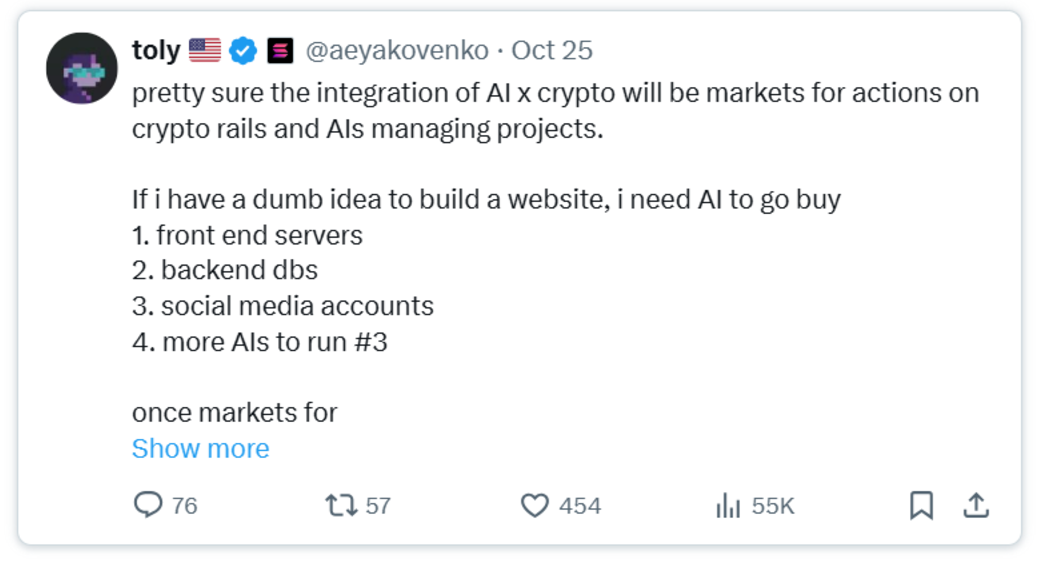
- Raise funds through tokens on @pumpdotscience;
- Use the raised funds to pay for access to relevant paid research and cover computational costs on decentralized computing networks (like @kuzco_xyz, @rendernetwork, @ionet, etc.) for simulating various compounds;
- Use bounty platforms like @gib_work to recruit humans to perform actual work tasks (e.g., running experiments to validate/refine simulation results);
- Or execute a simple task, like helping you build a website or creating AI-generated artwork (e.g., @0xzerebro).
- There are many other possibilities.
Why does it make more sense for agents to perform financial activities on-chain (rather than through traditional financial systems)? Agents can fully leverage both traditional financial systems and cryptocurrencies. Here are several reasons why cryptocurrencies are particularly suitable in certain aspects:
Micropayment scenarios—Solana excels in this area, with applications like Drip already demonstrating its potential.
- Speed—Instant settlement can be crucial for agents, especially when you want them to achieve optimal capital efficiency.
- Accessing capital markets through DeFi—Once agents begin engaging in financial activities beyond strict payments, the advantages of cryptocurrencies become particularly evident. This could be the most powerful reason for agents to participate in the crypto economy. Agents can seamlessly mint assets, trade, invest, borrow, leverage, and more.
- Solana is particularly well-suited to support this capital market activity because the Solana mainnet already has a rich top-tier DeFi infrastructure.
Finally, technology is often path-dependent; the key is not which product is the best, but which product first reaches critical mass and becomes the default path. If we see more agents creating significant wealth through cryptocurrencies, this could solidify the connectivity of cryptocurrencies as an important capability for agents.
What we hope to see
Bold experiments combining agents with wallets that can perform operations on-chain. We do not provide overly specific definitions here because the possibilities are very broad, and we expect the most interesting and valuable agent application scenarios to be those we cannot predict. However, we are particularly interested in exploring and building infrastructure in the following directions:
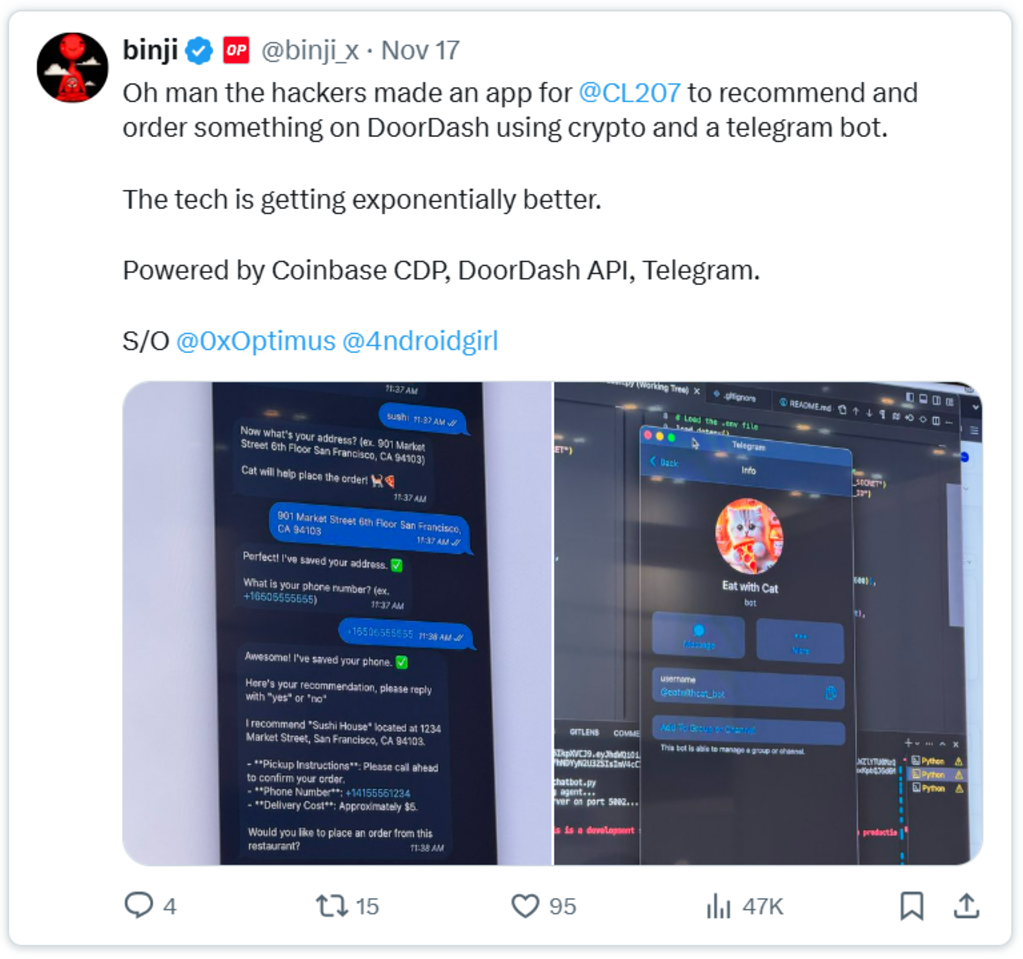
At least in prototype stage on the testnet (preferably on the mainnet).
2) Making LLMs Proficient in Writing Solana Code and Empowering Solana Developers
Why are we focusing on this? LLMs already possess powerful capabilities and are rapidly advancing. However, writing code is a particularly noteworthy direction in the application of LLMs because it is a task that can be objectively assessed. As explained in the post below, "Programming has a unique advantage: through 'self-play,' it can achieve superhuman data scaling. Models can write code, then run it, or write code, write tests, and check for self-consistency."

- Limiting the negative impact of hallucinations—Current models are very powerful but still far from perfect. Agents cannot be given complete freedom to perform operations.
- Promoting non-speculative application scenarios—For example, allowing you to purchase tickets through @xpticket, optimize yields for stablecoin portfolios, or order food on DoorDash, etc.
Currently, although LLMs are still far from perfect in writing code and have some obvious shortcomings (for example, they perform poorly in finding vulnerabilities), tools like GitHub Copilot and AI-native code editor Cursor have fundamentally changed software development (even changing the way companies recruit talent). Given the expected rapid advancements, these models are likely to revolutionize software development. We hope to leverage this progress to increase Solana developers' productivity by an order of magnitude.
However, there are currently some challenges hindering LLMs' performance in understanding Solana:
- There is not enough high-quality raw data for LLM training;
- A lack of sufficient verified build versions;
- Insufficient high-value information exchange in places like Stack Overflow;
- The rapid development of Solana infrastructure means that code written even six months ago may not fully meet current needs;
- There is no way to assess the model's understanding of Solana.
What we hope to see
Help us publish better Solana data on the internet!
- More teams releasing verified build versions.
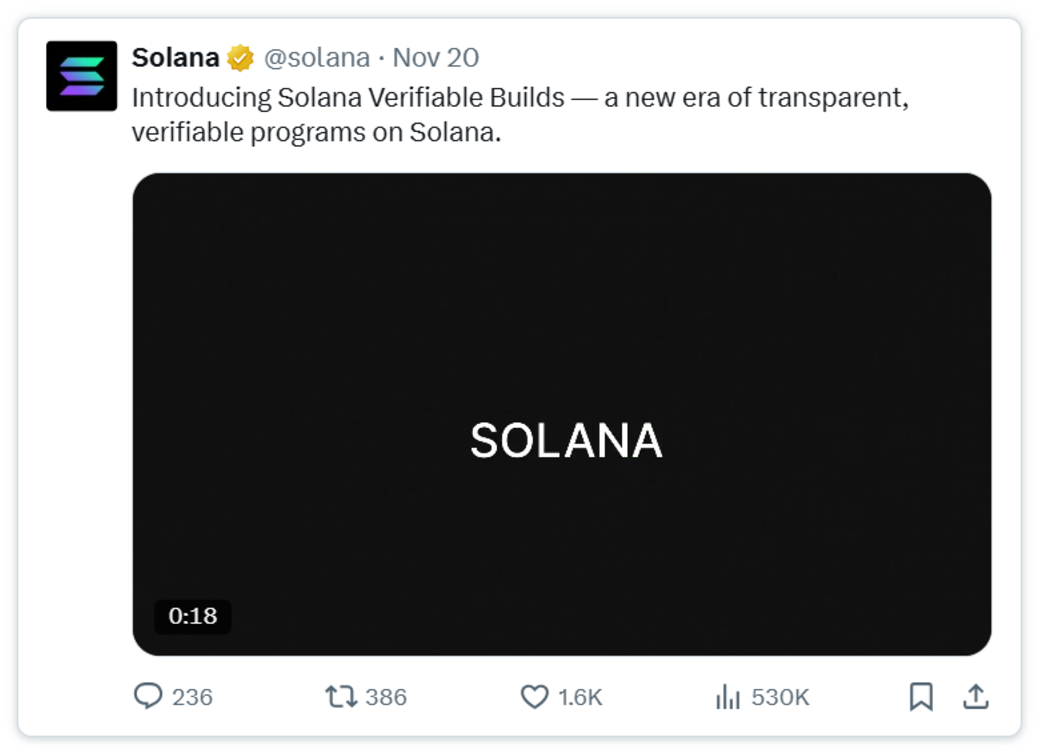
We hope more people in the ecosystem will actively participate in Stack Exchange, asking good questions and providing high-quality answers;
Create high-quality benchmarks to assess LLMs' understanding of Solana (RFP coming soon);
Create LLM fine-tuned versions that score well on the above benchmarks, and more importantly, accelerate the work of Solana developers. Once we have high-quality benchmarks, we may offer rewards for the first model to reach the benchmark score—stay tuned.
The ultimate achievement here will be a high-quality, differentiated Solana validator node client created entirely by AI.
3) Supporting an Open and Decentralized AI Technology Stack
Why are we focusing on this? It is currently unclear how power in the AI field will balance between open-source and closed-source AI in the long term. There are good arguments for why closed-source entities will remain at the technological forefront and capture most of the value from foundational models. The simplest expectation now is that the status quo will continue—large companies like OpenAI and Anthropic will push the technological frontier, while open-source models will quickly follow and eventually have uniquely powerful fine-tuned versions for certain use cases. We hope Solana can closely integrate and support the open-source AI ecosystem. Specifically, this means facilitating access to the following: data for training, computational power for training and inference, model weights of resulting models, and the ability to verify model outputs. We believe this is important for the following specific reasons:
A. Open-source models help accelerate debugging and innovation in model development The way the open-source community quickly refines and fine-tunes open-source models like Llama demonstrates how the community effectively complements the efforts of large AI companies in advancing AI capabilities (even Google researchers pointed out last year that regarding open-source, "we have no moat, and neither does OpenAI"). We believe a thriving open-source AI technology stack is crucial for accelerating progress in this field.
B. Providing an outlet for those who may be forced to use AI they do not trust (e.g., state-sanctioned AI) AI is now possibly the most powerful tool in the arsenal of dictators or authoritarian regimes. State-sanctioned models provide a version of truth recognized by the state and become a massive means of control. Highly authoritarian regimes may also have better models because they are willing to ignore citizens' privacy to train their AI. The question of when AI is used as a control tool is not if it will happen, but when; we hope to support the open-source AI technology stack as much as possible to prepare for this possibility.
Solana is already home to many projects supporting the open-source AI technology stack:
Grass and Synesis One are facilitating data collection;
@kuzcoxyz, @rendernetwork, @ionet, @theblessnetwork, @nosanaai, etc., are providing a wealth of decentralized computing resources.
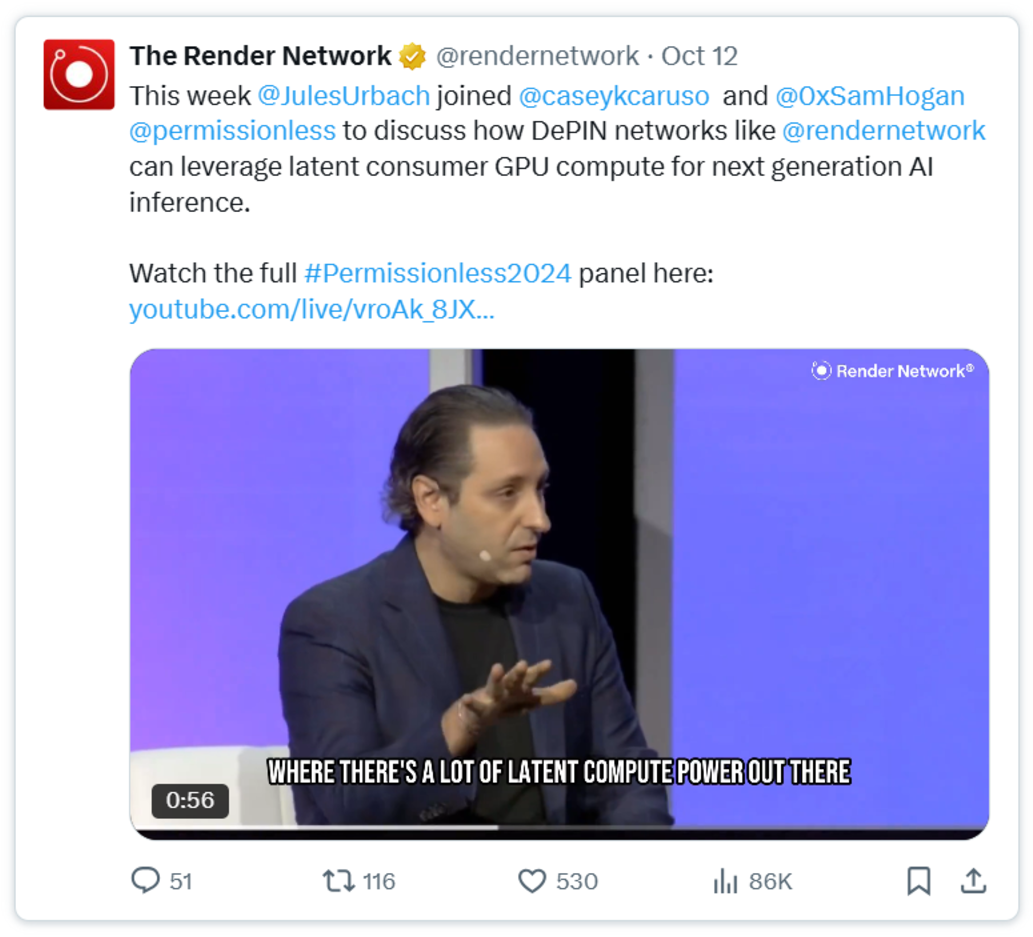
Teams like @NousResearch and @PrimeIntellect are working on developing frameworks to enable decentralized training (see below).
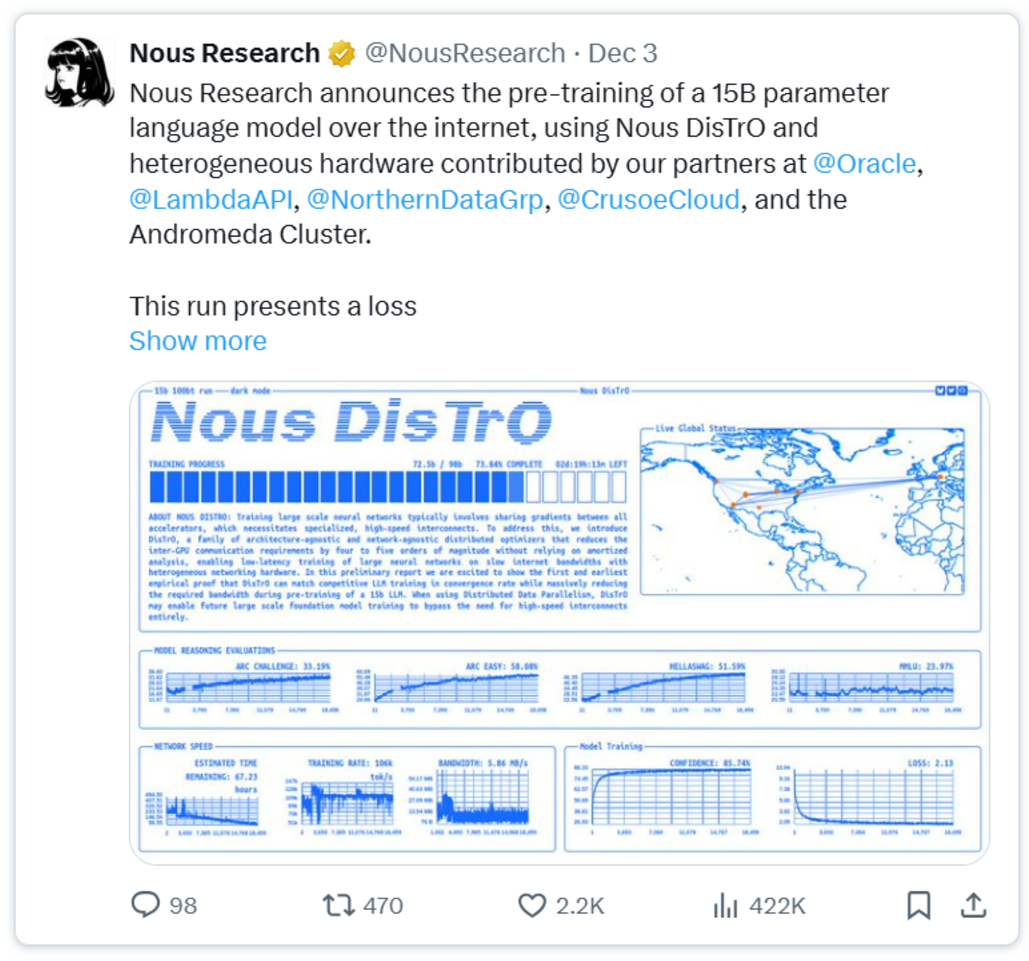
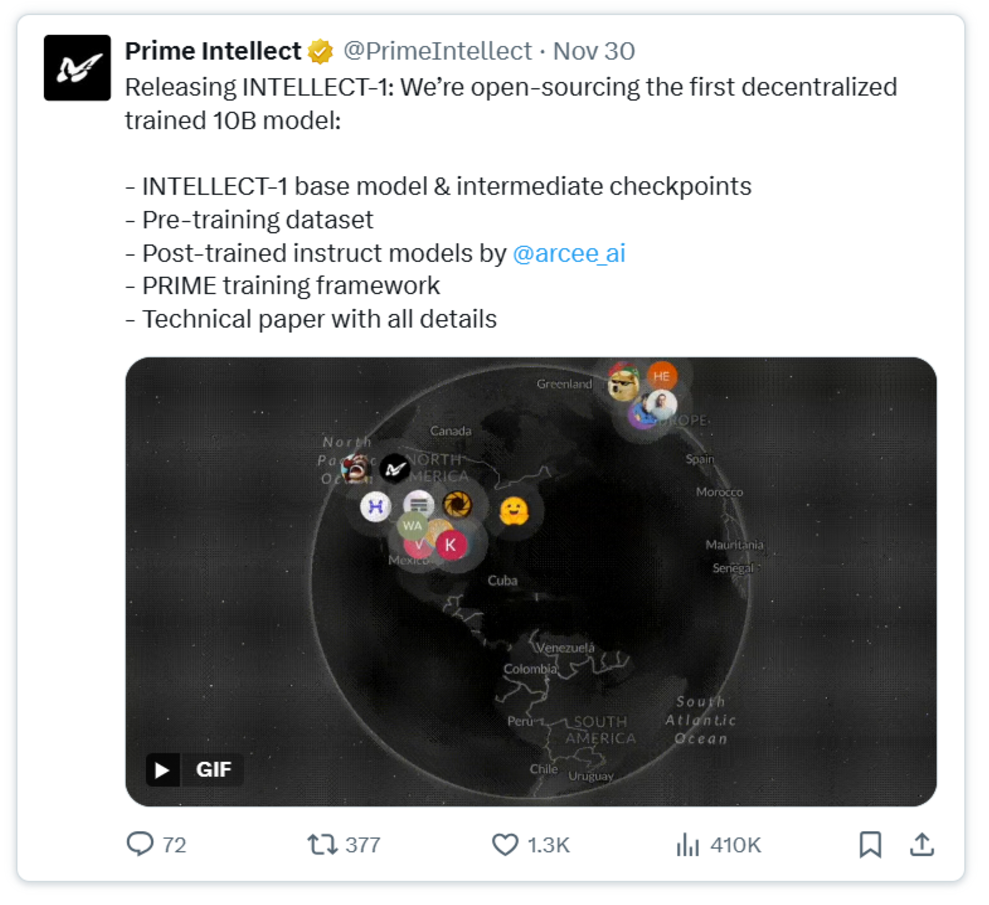
What we hope to see is more product development at all levels of the open-source AI technology stack:
- Decentralized data collection, such as @getgrassio, @usedatahive, @synesisone
- On-chain identity verification: including protocols that allow wallets to prove they are human identities, and protocols to verify AI API responses so that consumers can confirm they are interacting with LLMs
- Decentralized training: for example, @exolabs, @NousResearch, and @PrimeIntellect
- Intellectual property infrastructure: allowing AI to license (and pay for) the content it utilizes
Link to the article: https://www.hellobtc.com/kp/du/12/5568.html
Source: https://x.com/knimkar/status/1863719025500623344
免责声明:本文章仅代表作者个人观点,不代表本平台的立场和观点。本文章仅供信息分享,不构成对任何人的任何投资建议。用户与作者之间的任何争议,与本平台无关。如网页中刊载的文章或图片涉及侵权,请提供相关的权利证明和身份证明发送邮件到support@aicoin.com,本平台相关工作人员将会进行核查。




